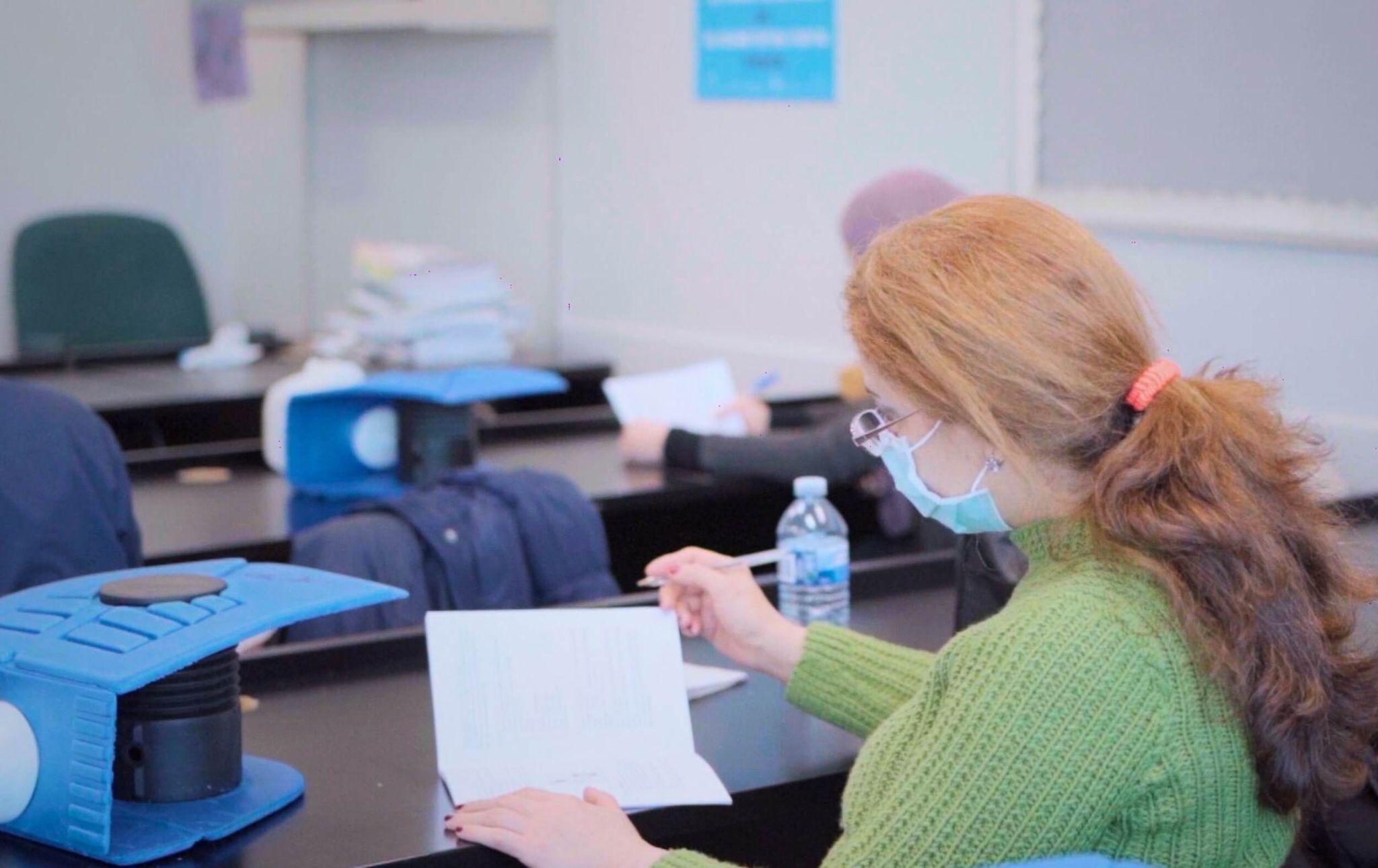Category: Medical Office Administrator

Becoming a Medical Office Assistant after our Medical Office Administrator course offers a unique opportunity to play a crucial role in the healthcare industry. What is the role of a Medical Office Assistant? A Medical Office Assistant provides administrative support to ensure the smooth operation of medical offices.
They handle tasks such as scheduling appointments, managing patient records, billing, and assisting with basic medical procedures, serving as a crucial link between patients and healthcare professionals.
At Medix College, our Medical Office Administrator Diploma program is designed to equip you with the necessary skills to excel in this vital position of a Medical Office Assistant. Earn your diploma in less than a year and embark on a rewarding career path.
One of the benefits of a career in medical office administration is the diversity of duties you’ll have the chance to perform each day. Today, we’ll explore the top 5 most important duties of a Medical Office Assistant and how our diploma program prepares you to excel at each one.
1. Patient Services and Billing
What does a Medical Office Assistant do? One of the primary duties of a Medical Office Assistant is managing patient services and billing. This includes billing patient services to the Ministry of Health or directly to the patient as required.
You will learn to navigate various billing codes and procedures, ensuring all services are accurately recorded and billed. This responsibility is critical for the financial health of the medical office and requires attention to detail and a thorough understanding of billing practices.
2. Health Information Management
Other essential Medical Office Assistant responsibilities include managing patient data and health information. This includes collecting patient information, maintaining medical databases, and ensuring that all records are accurate and up-to-date.
With the rise of electronic health records, this role has become increasingly important in ensuring the privacy and security of patient data. You will learn critical skills in data management and how to use medical software to streamline these processes.

3. Administrative Support and Scheduling
Administrative support is a cornerstone of the Medical Office Administrator’s role. You will schedule appointments, manage calendars, and ensure the office runs smoothly.
This includes using Microsoft Office applications to create documents, spreadsheets, and presentations. Your ability to organize and manage multiple tasks simultaneously will be crucial in maintaining the efficiency of the medical office.
4. Communication and Patient Interaction
Effective communication is essential in a medical setting. As a Medical Office Assistant, you will be the first point of contact for patients, and you will require strong communication skills to interact effectively with the public.
You will learn various communication styles and techniques to ensure you can handle patient inquiries, provide information, and manage any concerns with empathy and professionalism.

5. Medical Procedures and Protocols
Medical Office Administrators need a basic understanding of medical procedures and protocols. This includes knowledge of aseptic techniques, taking vital signs, and assisting with diagnostic testing and patient preparation. You will learn these skills to support the medical team and ensure that the office meets health and safety standards.
Prepare to Excel at All Medical Office Assistant Duties
Having discovered these essential duties, you may ponder the question: Is it worth becoming a medical office assistant? Becoming a Medical Office Assistant offers stable career prospects in diverse healthcare settings with opportunities for advancement.
Our Medical Office Administrator Diploma is a comprehensive 44-week program that combines in-class learning with a 240-hour externship. You will gain hands-on experience in real-world settings, preparing you to navigate the administrative work of a medical office effectively.
Key Areas Covered in the Program include billing patient services, health information management, keyboarding skills and medical transcription, aseptic techniques and medical office procedures, communication styles for dealing with the public, anatomy & physiology, medical terminology, CPR & Standard First Aid, taking vital signs, diagnostic testing, and patient preparation.
At Medix College, we believe in supporting our students’ personal and professional growth. Our programs focus on mindset development and financial literacy skills, with courses like Thought Patterns for High Performance and Mindsetting for Success and Well-being in the Digital Age.
The role of a Medical Office Assistant is multifaceted and integral to the healthcare industry. By mastering these top five duties and completing our comprehensive program, you will be well-equipped to excel in this rewarding career.
Are you ready to start our Medical Office Assistant online course?
Contact Medix College for more information!
Frequently Asked Questions
What is the role of a Medical Office Assistant?
Answer: A Medical Office Assistant provides administrative support to ensure the smooth operation of medical offices.
Question: Is it worth becoming a medical office assistant?
Answer: Becoming a Medical Office Assistant offers stable career prospects in diverse healthcare settings with opportunities for advancement.

The medical field relies heavily on a network of skilled individuals beyond doctors and nurses. Medical Office Administrators form an integral part of this network. What are the duties of a Medical Office Administrator? They ensure the smooth functioning of daily operations in clinics, hospitals, and other healthcare facilities by providing essential support to medical staff and patients.
The responsibilities of a Medical Office Administrator are varied and include a combination of patient care and administrative work, making them essential to efficiently running healthcare institutions. This blog post examines the primary responsibilities of a Medical Office Administrator, contrasts the role with a receptionist’s job, and assesses if choosing this career path after your training is wise.
What Are the Duties of a Medical Office Administrator?
The duties of a Medical Office Administrator cover a diverse range of tasks, which can be broadly categorized into three main areas: Patient Coordination and Care, Administrative Support, and Financial and Insurance Management:
1. Patient Coordination and Care: The primary duty of a Medical Office Administrator is to ensure exceptional patient care and support. They are often the first point of contact for patients and are responsible for greeting patients and family members, scheduling appointments, and ensuring general patient comfort during their visit.
Medical Office Administrators interact with a broad spectrum of patients, from the mentally ill and elderly to newborns and individuals with chronic conditions, adeptly managing this diversity by tailoring their communication and care approach.
2. Administrative Support: Medical Office Administrators are tasked with various administrative duties that keep the office running smoothly. These include accurate data input of vital information, managing medical records, and handling insurance reimbursements.
Medical Office Administrators are crucial in patient management as they maintain confidential medical records and process insurance payments. They ensure that all patient information is up-to-date and correctly filed, which is essential to effective patient care and the operation of the medical office.

3. Financial and Insurance Management: A significant part of a Medical Office Administrator’s job involves handling financial transactions, including billing patients, processing insurance claims, and determining coverage for each patient. Medical Office Administrators navigate the complex landscape of insurance claims and policies to ensure patients receive the coverage they deserve, often contesting denials and negotiating with insurers on behalf of the patient.
To flawlessly execute this task, they must comprehensively understand the various insurance plans and medical billing procedures covered in medical office admin training, process payments, and accurately assist patients with their insurance queries.
Is a Medical Office Administrator the Same as a Receptionist?
The Medical Office Administrator’s duties extend far beyond those of a standard receptionist. Medical Office Administrators are specialized professionals who require a comprehensive understanding of medical terminology, patient care protocols, and insurance billing procedures.
While there may be similarities between the roles of a Medical Office Administrator and a receptionist, particularly in terms of greeting patients and managing appointments. The Medical Office Administrator’s role is more integrated into the medical team, providing administrative support and direct patient care under the guidance of medical professionals. Their empathetic interaction and provision of emotional support make them a crucial part of the patient care team, enhancing the overall healthcare experience.

Is a Medical Office Administrator a Good Job?
With the healthcare industry continually growing, there’s a steady demand for skilled Medical Office Administrators, leading to job security and opportunities for advancement. Becoming a Medical Office Administrator can be a rewarding career path for those interested in the healthcare sector. It offers the opportunity to impact patient care and experience significantly. The role demands administrative skills and empathy, providing a challenging yet fulfilling work environment.
In addition, working as a Medical Office Administrator allows for a broad understanding of the healthcare system, which could pave the way for further career development in healthcare management, nursing, or other specialized medical fields. The satisfaction of contributing to patient well-being and the dynamic nature of the healthcare environment make it a compelling career choice for many.
Are you interested in our world-class medical office administration course?
Contact Medix College for more information.
Frequently Asked Questions
Question: What are the duties of a Medical Office Administrator?
Answer: The duties of a Medical Office Administrator cover a diverse range of tasks, which can be broadly categorized into three main areas: Patient Coordination and Care, Administrative Support, and Financial and Insurance Management.
Question: Is a Medical Office Administrator the same as a receptionist?
Answer: The Medical Office Administrator’s duties extend far beyond those of a standard receptionist. Medical Office Administrators are specialized professionals who require a comprehensive understanding of medical terminology, patient care protocols, and insurance billing procedures.
Question: Is a Medical Office Administrator a good job?
Answer: With the healthcare industry continually growing, there’s a steady demand for skilled Medical Office Administrators, leading to job security and opportunities for advancement.
Navigating the Healthcare Landscape: A Comprehensive Guide to the Medical Office Administrator Job Description
January 18, 2024
Are you considering a career in healthcare and wondering if a Medical Office Administrator role fits your personality, skills, and training? Exploring the duties and responsibilities of a Medical Office Administrator can help you decide if it’s something you can envision yourself doing in the short to long term.
One of the questions you’re most likely to want answers to is, What are the duties and responsibilities of a Medical Office Administrator? A Medical Office Administrator combines clerical and administrative duties in a hospital. While the role is predominantly customer-facing, Medical Office Administrators also assist physicians and other healthcare team members in ensuring a seamless healthcare experience for patients. This blog post provides a comprehensive guide to the Medical Office Administrator job.
What is a Medical Office Administrator?
If you’ve been to a hospital or clinic, there’s a good chance you’ve interacted with a Medical Office Administrator (MOA). But what does a medical front office administrator do? A Medical Office Administrator is a vital member of the healthcare team, primarily responsible for managing administrative and clerical tasks within a medical clinic or healthcare facility. In addition to general responsibilities, MOAs may be involved in more specialized tasks depending on their workplace. This can include processing insurance forms, handling billing and payments, and coordinating with other healthcare providers for patient care.
Now, what are the roles of a Medical Office Administrator? MOAs handle many responsibilities related to their professions, such as appointment scheduling, data input and billing, word processing, and patient record maintenance. Medical Office Administrators also serve as the first point of contact for patients, providing necessary support services for the day-to-day operation of a doctor’s office. Ensuring high-quality customer service, managing phone calls, and dealing with various supplies are key responsibilities in a Medical Office Administrator job description. This position requires a combination of administrative skills and knowledge of medical terminology and healthcare procedures.

Exploring the Medical Office Administrator Job Description and How to Pursue This Career
Becoming a Medical Office Administrator (MOA) involves a series of steps, from obtaining a high school diploma or a General Educational Development (GED) certification. While specific educational requirements can vary, many employers look for candidates who have completed an approved Medical Office Administrator program, such as the one offered at Medix College.
Our program includes courses in anatomy and terminology, diagnostic testing and patient preparation, and infection control. Gaining experience in administrative roles can also be beneficial. Our program requires students to complete a 240-hour off-site externship placement.
As you may observe from the job description of a Medical Office Administrator, some roles may require additional certification, which involves passing an exam and demonstrating proficiency in the relevant skills and knowledge. Career progress in this sector also depends on lifelong learning and keeping up with the most recent developments in healthcare administration.

Are Medical Office Administrators in Demand in Canada?
The role of a Medical Office Administrator (MOA) is indeed in high demand in Canada. This growing demand is primarily driven by the country’s aging population, which has increased the need for healthcare services. As a result, administrative support in medical settings, such as clinics and hospitals, is a significant requirement.
In Ontario, for example, the employment outlook for Medical Administrative Administrators is positive for the 2023-2025 period. Similarly, in Alberta, there is a strong demand for these professionals. Overall, the healthcare field in Canada is considered stable, with a consistent need for skilled MOAs. The projection of 33,700 new job openings for Medical Office Administrators in Canada between 2019 and 2028 further underscores the bright future and high demand for this profession nationwide.
Are you interested in our medical office administration course?
Contact Medix College for more information.
FAQs
Q: What are the roles of a Medical Office Administrator?
A: MOAs handle many responsibilities related to their professions, such as appointment scheduling, data input and billing, word processing, and patient record maintenance.
Q: What are the duties and responsibilities of a Medical Office Administrator?
A: A Medical Office Administrator combines clerical and administrative duties in a hospital.
Q: What does a medical front office administrator do?
A: A Medical Office Administrator is a vital member of the healthcare team, primarily responsible for managing administrative and clerical tasks within a medical clinic or healthcare facility.
Navigating Your Career Path After Medical Office Admin Training
November 16, 2023
Ready to pursue your dream healthcare administration career? Our 44-week diploma program is the perfect starting point for a fulfilling job. When you graduate, you will have all of the necessary skills to meet the demands of an administration role in any busy medical setting.
Medical office administration graduates perform various tasks, including medical billing, patient record keeping, appointment scheduling, and numerous clerical tasks completed using industry-standard software programs. These tasks are essential to the success of any medical office and will always be in demand, ensuring a multitude of job opportunities will always be available to you.
Medix College puts students at a significant competitive advantage due to our relationships with several employers in the field. Our graduates land numerous positions that allow them to put their new skills to work.
Keep reading to explore some of the options that will become available to you upon graduation and find the answers to questions: why choose medical office administration? This is simple: Medical office administration graduates perform various tasks, including medical billing, patient record keeping, appointment scheduling, and numerous clerical duties completed using industry-standard software programs. Is medical office administration a good career? Well, Medical Office Administrator jobs tend to be stable, provide a comfortable work environment, and offer room for career advancement.
Explore Medical Office Administrator Jobs After Training
Is being a Medical Office Administrator (MOA) a difficult job? Medical office administrators support doctors and other medical professionals in completing various clerical and administrative tasks that keep clinic operations running smoothly. These professionals are conscientious, organized, and detail-oriented, with a strong understanding of current healthcare administration software, medical terminology, and various office procedures. Some of their clinical duties include taking vital signs, urinalysis, well baby, taking height and weight, and more.
This position is relatively easy for an individual who is friendly, approachable, and comfortable being the first point of contact for patients. Excellent customer service skills and problem-solving competencies will help you thrive in this front-facing position.

Use Your Industry Knowledge to Become a Medical Office Transcriptionist
Medical transcription works closely with medical professionals to ensure that each appointment is well documented to promote the most effective care for patients. In the medical field, detailed records of a patient’s symptoms, health history, diagnostic test results, and treatment plans created by other healthcare professionals are paramount to their care.
As a transcriptionist, you would be responsible for transcribing confidential notes about each visit dictated to you by a healthcare professional. You would use the grasp of medical terminology, anatomy, and physiology that you’ll develop in training to put together comprehensible notes that medical professionals can refer to as they plan treatments or prescribe medications. To thrive in this position, you must be detail-oriented with strong critical thinking skills and accuracy.
Good With Details? Consider the Role of a Medical Billing Specialist
Do you want an MOA job that allows your numerical skills to shine? Look no further than a medical billing specialist role. Professionals in this position must prepare and submit claims to insurance companies, prepare and send invoices, update patient payment information, monitor and manage late payments, investigate and appeal denied claims, and troubleshoot various payment problems for patients. This career path requires exceptional attention to detail, strong communication, and problem-solving skills.

Our courses cover all relevant aspects of medical administration, from infection control to nutrition. Students practice the skills they receive in a 240-hour externship. If you’re interested in any of the positions discussed above, don’t wait to get started. Our flexible instruction formats (in-person, online, online-live, and hybrid) help you begin your career as you manage your other responsibilities.
FAQs To Consider:
Q: Is medical office administration a good career?
Medical Office Administrator jobs tend to be stable, provide a comfortable work environment, and offer room for career advancement.
Why choose medical office administration?
Medical office administration graduates perform various tasks, including medical billing, patient record keeping, appointment scheduling, and numerous clerical duties completed using industry-standard software programs.
Is being a Medical Office Administrator (MOA) a difficult job?
Medical office administrators support doctors and other medical professionals in completing various clerical and administrative tasks that keep clinic operations running smoothly.
Are you ready to start our medical administrator course?
Contact Medix College to learn more!

If you’re looking for a rewarding career in the healthcare field and seek a way to use your organizational skills to help others, a medical office administrator role could be perfect for you. Healthcare facilities are very busy with large volumes of information passing through them each day. That information must be processed and organized, payment must be received, and appointments must be booked. If you’re interested in the healthcare industry but don’t see yourself treating patients directly, the role of a medical office administrator is certainly worth exploring.
Medical office administrators enjoy a variety of career perks including a comfortable work environment, regular working hours, and an interesting, fast-paced environment. Does that sound good to you? If so, keep reading. We’ll tell you everything you need to know about the daily duties of this important position, the skills you’ll need to get hired and succeed in the role, and how our hands-on healthcare training will help you reach your career goals.
What Does A Medical Office Administrator Do?
Medical office administrators perform a wide variety of administrative duties in healthcare facilities like hospitals and clinics. Their responsibilities include but are not limited to office procedures like record-keeping, basic bookkeeping, and communications (both internal and external). But, what does a medical office administrator do that other office workers don’t? The list is long. In this role, you’ll complete medical billing tasks, manage patient records, transcribe medical information, welcome patients, and even prepare them to see medical professionals. You may take their vitals, sanitize areas, and complete diagnostic testing. These tasks require a range of specialized skills.

What Skills Do You Need To Become A Medical Office Administrator?
The work of an effective medical office administrator occurs with the help of various software tools. For this reason, a degree of technological proficiency will be necessary in order for you to stand out to future employers. Industry-specific software tools will help you perform your scheduling, billing, and record-keeping tasks. In addition to tech skill, you’ll need to be familiar with medical terminology which will help you transcribe accurately and quickly. In order to prepare patients for their appointments, you’ll need to be well versed in certain diagnostic tests, know various aseptic techniques, and understand various bodily systems. In case of an emergency, you’ll need to know CPR and first aid. Soft skills for medical office administration include organization skills, interpersonal skills, the ability to multitask, and excellent communication skills.

How We Will Help You Succeed
At Medix College, we have over fifty years of experience producing highly employable graduates who go on to work in reputable healthcare organizations. We accomplish this through hands-on training and a strong support system for students who can always reach out to our caring instructors for the help they need. Our medical office administrator students learn current software tools used in the industry like AbelMed for OHIP billing and Accuro for electronic medical record keeping. In labs, students practice the skills they learn in our traditional learning format including keyboarding and Microsoft Office applications. All of the skills discussed above are covered at length in our program leaving our students fully prepared to pursue medical office assistant careers and thrive in their positions.
FAQs To Consider
What is medical office administration?
Medical office administrators perform a wide variety of administrative duties in healthcare facilities like hospitals and clinics. Their responsibilities include but are not limited to office procedures like record-keeping, basic bookkeeping, and communications (both internal and external).
What can you do with a medical office administration degree?
You can work as a medical office assistant. Medical office administrators enjoy a variety of career perks including a comfortable work environment, regular working hours, and an interesting, fast-paced environment.
Are you ready to start our medical office administrator program?
Contact Medix College for more information!
How Medix College Assists with Career Search after Medical Office Administrator Training
April 07, 2023
The job of a Medical Office Administrator (MOA) requires certain management skills. These skills are crucial to the smooth-running operation of hospitals, clinics, and other related workspaces. Since these skills are useful in multiple settings, MOA graduates must make important career decisions at some point.
At Medix College, we provide Medical Office Administration training through a carefully curated program that can be completed in less than one year. Thanks to our experience in this industry, we also ensure ample opportunities to set our students on the right career path. This is so they can look forward to a more secure future in their chosen career. Read on to find out how we do this.
An Overview of the Medical Office Admin Diploma Program
The Medical Office Admin diploma program at Medix College can be completed in just 44 weeks. This program prepares you for a career in administrative positions in the medical field. Some roles you’ll be able to fill upon graduation include:
- Medical Office Administrator
- Medical Office Assistant
- Medical Office Secretary
- Medical Billing Specialists
- Medical Transcriptionist
Through a wide range of courses that focus on medical terminology, nutrition, infection control, and more, students gain a foundational understanding of the industry, preparing them for success in the role. Students are also exposed to a 240-hour externship to put their newfound skills to use and master them.
A Strong Relationship with Industry Employers
Medix College has built a long-standing relationship with several employers in the industry. And these relationships have been leveraged over time to benefit our graduates. If you’re currently enrolled in the Medical Office Admin diploma program, you’ll likely find work shortly after graduation. This is because Medix College is typically contacted by these employees whenever they have an opening.

Gain Valuable Career Insights From Job Seminars
At Medix College, students are treated to an extensive job search seminar where they can get familiar with relevant career insights. The seminar also provides important resume advice, interview skills, and other job-related tips.

Guest speakers are drawn from medical professionals and prospective employers in hospitals and medical offices, while past graduates also get the nod. These people are frequently invited to speak to the students undergoing Medical Office Admin training and to give them relevant job-search advice and information.
Practical Training Through a 240-Hour Externship
Students can undertake a 240-hour externship across several industry-related workplaces. This is an experience that has proven immensely beneficial for students. These externships provide an avenue to gain relevant industry exposure while paving the way for future career inroads.
Students learn about the duties, responsibilities, and skills that a Medical Office Administrator role demands. Some students leverage this externship period to make relevant industry connections and broaden their professional network horizons. And these relationships can ultimately give them a solid headstart in the race to find that future job.
Ready to begin Medical Office Admin courses?
Contact Medix College to learn how you can get started.
4 Medical Billing Tips for Students in Medical Office Admin Training
September 16, 2022As a medical office administrator, you’ll be responsible for multiple duties that help a clinic run smoothly and keep patients satisfied. One of the most important medical office administration tasks you’ll need to complete on a daily basis is billing. This process is very important as it ensures that each clinic is properly reimbursed for the services offered whether that’s through the Ministry of Health, through insurance, or out of pocket. Medical billing involves: maneuvering a variety of codes, processing insurance claims, and managing invoices. Here are five helpful tips for mastering this crucial aspect of your job.
1. Bookmark the Provincial Schedule of Benefits to Avoid Setbacks
A common issue that comes up during billing is forgetting which fee code goes with what procedure. This is easy considering there are so many codes. Though fee codes differ from province to province, they are all listed in the provincial schedule of benefits which you should keep readily available. To save time, try highlighting codes that you use frequently to avoid any setbacks in billing.
2. Bill Daily to Avoid Getting Behind
While juggling the many tasks involved in medical office administration, it’s easy for non-urgent tasks like billing to fall to the wayside. When you fall behind on billing, your clinic may not get compensated on time which can present a serious problem if this becomes a recurring issue. After medical office admin training, it’s a great idea to make billing a part of your daily routine so that nothing piles up and your clinic gets paid on time.
At the same time, keep an eye on cut-off dates. In a medical billing context, cut-off dates refer to a deadline for submitting clinic claims in order to get paid on time. If medical billing claims aren’t submitted in a timely fashion, the claims may no longer be eligible for payment. This is a great example of why it’s so beneficial to do your billing daily. You won’t have to play catch up and your clinic won’t have to miss out on any funds.

3. Always Verify Patient Information After Medical Office Admin Training
Just like coding a procedure incorrectly, recording the wrong patient information can lead to claim rejections. This is a major inconvenience but it can easily be avoided by simply initiating a conversation with patients when they approach the front desk. For example, you can ask patients whether all their information is up to date. Addresses, for example, change often. You could make it a habit to ask your patients, “Are you still living at this address?” in order to avoid discrepancies in their files.

4. Have a Plan for Managing Rejected or Denied Claims
Even if you’re confident after completing your medical office administration course and you do everything in your power to avoid rejected claims, they will still happen from time to time. It’s good to have a system in place for handling them. Luckily, most of the time, the solution is very simple and all you’ll have to do is take note of the error, correct it, and resubmit the claim. However, dealing with denied claims may require you to send in an appeal, as sometimes the reason for the denial is not always clear. Through our medical office administration program, you’ll be introduced to the ins and outs of medical billing and all the other aspects of this dynamic career.
Ready to start medical office administration school?
Contact Medix College for information.
5 Organization Tips for Graduates of Medical Office Assistant School
August 26, 2022Working in the healthcare industry provides a dynamic, fast-paced career that is not only lucrative but also extremely rewarding. Job Bank Canada projects that the demand for medical office administrators will remain high through to the end of the decade. In Ontario specifically, prospects are especially good due to general growth, province-wide investments in new hospitals and healthcare facilities, and upcoming retirements.
At Medix College, our students receive a comprehensive, practical, and relevant education to acquire the knowledge and skills needed to succeed in an administrative role within a medical office. In addition, students are required to complete a 240-hour externship to truly experience their future careers in a real healthcare setting. As you’ll learn during our diploma program, a successful medical office administrator must have excellent organizational skills. Keep reading to learn 5 tips you can use to keep your medical office running smoothly when you graduate.
1. Organize the Physical Space of The Office
When you start your new career after medical office administration school, the first task you’ll want to focus on is organizing the physical space of the office. By going through every space of the office, you’ll not only gain an understanding of where everything is, but you’ll also be able to define areas that are causing workflow barriers and find solutions to them. Decluttering provides a better first impression for clients when they walk in, while labelling everything will help with staff with organization and efficiency.

2. Organize Your Time by Prioritizing Your Tasks
Once you’ve organized the physical aspects of the office, you’ll gain a better understanding of the practice’s priorities and be able to create a list of short and long-term goals. As a medical office administrator, having effective time management is of the utmost importance. To work effectively and proficiently, be sure to prioritize your goals and tasks from urgent to less important. Getting into the habit of creating a daily to-do list with the most urgent tasks at the forefront can keep you focused on accomplishing the most important tasks first.
3. Categorize Your Incoming Mail
Checking and responding to mail can be a very time-consuming aspect of your career. Although many medical office administrators respond to emails and inquiries throughout the day, it can be more efficient to plan a block of time for each day to focus on mail. By using the same prioritization methods that you do with your tasks, you can stay organized by placing mail into 3 distinct categories: urgent, not so urgent, or file. Once you’ve done this, you can attend to urgent matters immediately while putting off less urgent tasks for another time.
4. Use the Technology You Learn in Medical Office Administration School to Your Benefit
Our medical office administration training is current and relevant to today’s modern technologies. Our students are provided with a laptop where they learn different applications and software such as Microsoft Office, AbelMed for OHIP billing, and Accuro for Electronic Medical Records (EMR). Other technologies that can help with organization and efficiency in a medical office include apps and software that handle staff scheduling, patient portals and online scheduling, electronic prescribing, medical and office inventory with scheduled orders, and recovery software for a backup of vital and confidential data.

5. Use an Office Calendar to Keep Everyone Informed
Incorporating an office wide calendar that is accessible to all staff allows for a helpful visual aid with reminders of important events to keep a medical office running smoothly. An office calendar can include information such as staff scheduling, vacation time and requests, meetings, financial report deadlines, and so on. Publishing your office calendar at the beginning of the month and adding to it when new events arise is a vital step to maintaining an organized office.
If you consider yourself to be driven and organized, caring and compassionate, then becoming a medical office administrator may be the perfect career choice for you. At Medix College, our comprehensive program can be completed in person or online in less than a year!
Are you interested in taking a medical office administration course?
Contact Medix College for more information today!
3 Accounting Tips for Students in Medical Office Administration Training
July 29, 2022Accounting is an essential component of any operating medical office due to the nature of appointment bookings, service charges, and more. With bookkeeping and coding playing a major role as a medical office administrator, these concepts, techniques, and processes are important to learn and become comfortable with for a successful career.
At Medix College, students earning their Medical Office Administrator diplomas cover a number of applicable topics for life on the job. Some of these include billing patient services to the Ministry of Health or patient as required, health information management, patient data collection, keyboarding skills, medical transcription, and more. If you want to get a grasp on how to approach accounting and billing as an office administrator, then keep reading for 3 tips to help you on your way.
1. Encourage Your Office to Go Paperless
In any medical office, there is a considerable amount of administration to be done when it comes to bookkeeping, reporting, scheduling, and more. With paperless operations, not only will the office save money on paper, ink, and other printing costs, but the office will also be able to benefit from seamless online operations as a result.
After you complete medical office admin training, it may be a good idea to urge your office to go paperless. This will increase efficiency around the office while creating less of an impact on the environment. It will also show your dedication to smooth operations and your ability to contribute to the betterment of the office.

2. Stay Up-to-Date with the Collections Process
Oftentimes, if you wait until there is a backlog of transactions to be made and billings to be processed, you’ve already created an issue. Staying up to date with payment collections is crucial to the overall success of the medical office you work in. One tip for staying up-to-date on these involves making sure each and every patient seen has provided the office with the necessary billing information. This may include personal information, health card information, health insurance information, and more.
If these pieces of info are left undocumented, then when it comes time to collect payment, you’ll find yourself caught in a web of missing communications. This will impede your efficiency and slow down office operations while you try to sort out each issue with each patient. Another tip here is to stay informed. Billing codes and regulations change periodically, and not keeping up with the changes may result in the inability to collect payment from an individual or the Ministry of Health. Staying up-to-date with billing best practices will save your office time, money, and resources in the long run.

3. Minimize Billing and Coding Errors with Medical Office Administration Training
One thing is for certain after medical office administration training, and that is that you want to avoid as many billing and coding errors as possible. When you’re brand new on the job, it may take some time getting used to these processes, especially when they do change from time to time. However, familiarizing yourself with the billing process during your training at Medix will significantly improve your skills for day-to-day tasks on the job.
Many billing codes are now digitized, meaning you can search and locate the most up-to-date codes for various procedures, services, and claims. One important tip here is to be thorough and to always double check your selections. If you send the wrong code for an invoice, then it may result in a delay in processing and lack of funds coming into the office. With plenty of practice in the medical office simulator with Medix College, you’ll have experience working and problem solving in an environment that mimics your future workplace. With careful attention to detail, you can avoid mistakes that would otherwise set you back.
Interested in taking a medical office administration course?
Contact Medix College for more information!
Importance of Infection Control for Medical Office Administration Training
May 20, 2022In medical offices, many patients come and go, possibly leaving behind and taking with them various types of illnesses and infections. Over the past year, the whole world experienced how fast the spread of diseases can occur with the COVID-19 pandemic, but we also got to hone in on how important it is to have infection control strategies in place within healthcare settings and beyond.
If you’re considering a medical office administration (MOA) career, you’ll need to know and understand more about the role and why infection control is so important within healthcare settings. Here, we explore the basics of infection control and how it applies to MOA careers. Read on to learn more.
The Importance of Infection Control as an MOA
Once you become an MOA, you will be working directly with patients, as you’ll be one of their first interactions upon entering the medical office. Since you will be in such close proximity to patients who may be sick, it will be critical to practice effective infection control so as to avoid spreading infections to healthy patients who may simply be visiting for an annual check-up.

During your program at Medix College, you will learn about the infection process, micro-organism growth, hand washing techniques, autoclave use and sterilization, and the accepted standards and protocols for handling specimen samples. This knowledge will provide you with an understanding of why infection control is so important in this role.
How MOAs Practice Infection Control in Healthcare Settings
Practicing infection control techniques–such as washing your hands and wearing PPE–help to protect yourself, your colleagues, and clients and limit the spread of infection and diseases. That’s because these practices aim to shield from germs and bacteria that could be coming in and out of the medical office. Once you become an MOA, you’ll be in contact with many people daily, so you will need to be sure that you do not accidentally infect anyone that could be vulnerable.
Transmission-based precautions are set to help reduce the spread of infections by airborne and droplet routes. There are special arrangements that you can make for patients with respiratory infections. Screening patients at the time of their scheduled visit, seeing them at the end of the day, quickly triaging them out of common areas, and closing the door to the examination room are a few examples. Following these protocols will ensure that all patients feel safe in any healthcare setting you work in after graduation.

Environment control is also an essential part of infection control that you will learn about at medical office administration school. Environment control includes the sanitization and disinfection of furniture, equipment, and surroundings within a space. For instance, in a clinic or hospital, many people use the same sinks to wash their hands during the day. Since clinics and hospitals are generally filled with sick patients and the healthcare workers that treat them, it’s important to sanitize and disinfect these sinks, which can often rival Petri dishes of bacteria.
Prepare for Medical Office Administration Success With Practical Training
During your program at Medix College, you will have a 240-hour off-site externship placement where you will get to put the skills you’ve learned to use, gaining real-life experience in a medical office environment. This will give you a sneak peek at what life as an MOA will truly be like.
Throughout the placement, you will learn the various tasks you’ll take on daily. Some of which will include billing patient services to the Ministry of Health or the patient, health information management, scheduling appointments, diagnostic testing, patient preparation, and more.
MOAs are also responsible for several other tasks, such as measuring patients and recording their height and weight, cleaning instruments, stocking treatment areas, and escorting patients in and out of examination rooms. You will learn to complete all these tasks in medical office administration courses such as Anatomy and Terminology, Diagnostic and Testing Preparation, and Clinical Secretarial and Professionalism.
The instructors at Medix College have professional experience in the field and will be readily available to guide and instruct you through your program, preparing you for a successful career.
Are you considering medical office administration training?
Contact Medix College to learn more about our program.








